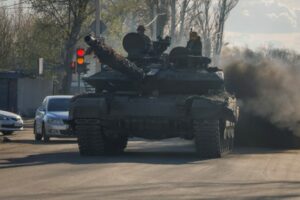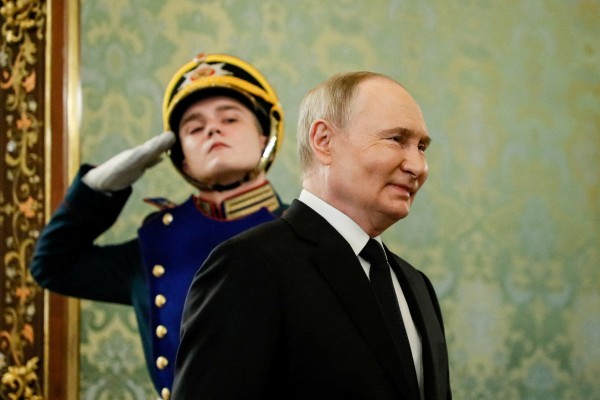MOSCOW/LONDON: Russian President Vladimir Putin is ready to halt the war in Ukraine with a negotiated ceasefire. But this must recognise the current battlefield lines, sources told Reuters.
Putin reportedly expressed his frustration over Western-backed attempts to stymie negotiations, as well as Ukrainian President Volodymyr Zelenskyy’s decision to rule out talks, to some close confidantes.
“Putin can fight for as long as it takes, but Putin is also ready for a ceasefire – to freeze the war,” said a senior Russian source who has worked with Putin, and is privy to top level conversations in the Kremlin.
Asked about the Reuters report at a news conference in Belarus on Friday, Putin said peace talks should restart.
🚨🇷🇺🇺🇦BREAKING: Putin declares that peace talks must reccomence.
But wait, since Zelensky’s presidential term has now expired who will sign Ukraine’s surrender/capitulation documents? pic.twitter.com/0TgxD4JYy4
— Aussie Cossack (@aussiecossack) May 24, 2024
“Let them resume,” he said. However, a ceasefire should be based on “the realities on the ground” and on deal agreed upon during a previous peace talk in the first weeks of the war. “Not on the basis of what one side wants,” he said.
Ukrainian Foreign Minister Dmytro Kuleba said Putin was sending “phony signals” to derail a Ukrainian-initiated peace summit in Switzerland next month.
Why are Russian “sources” suddenly telling the media that Putin is willing to halt the war at the current battle lines? It’s simple.
Putin is desperately trying to derail the Peace Summit in Switzerland on June 15–16. He is scared of its success. His entourage sends these phony…
— Dmytro Kuleba (@DmytroKuleba) May 24, 2024
“Putin currently has no desire to end his aggression against Ukraine. Only the principled and united voice of the global majority can force him to choose peace over war,” Kuleba said.
Putin’s spokesman Dmitry Peskov said the country did not want “eternal war.”
Sources said Putin felt the gains in the war so far were enough to sell a victory to the Russian people.
Peskov said Russia had no need for mobilisation and was instead recruiting volunteer contractors to the armed forces. The prospect of a ceasefire, or even peace talks, currently seems remote.
Zelenskyy has repeatedly said peace on Putin’s terms is a non-starter. He has vowed to retake lost territory, including Crimea, which Russia annexed in 2014. He signed a decree in 2022 that formally declared any talks with Putin “impossible.”
The Swiss peace summit was convened at the initiative of Zelenskyy, who says Putin should not attend. Moscow has said the talks are not credible without it being there. Ukraine and Switzerland want Russian allies including China to attend.
A U.S. State Department spokesperson said any initiative for peace must respect Ukraine’s “territorial integrity, within its internationally recognised borders,” and described Russia as the sole obstacle to peace in Ukraine.
Both Russia and Ukraine have also said they fear the other side would use any ceasefire to re-arm.
Kyiv and its Western backers are banking on a $61 billion U.S. aid package and additional European military aid. Zelenskyy described this to Reuters this week as “one of the most difficult moments” of the full scale war.
Putin’s insistence on locking in any battlefield gains in a deal is non-negotiable, sources suggested. He would however, be ready to freeze the conflict at the current front lines, they said.
“Putin will say that we won, that NATO attacked us and we kept our sovereignty, that we have a land corridor to Crimea, which is true,” one of them said.

Freezing the conflict along current lines would leave Russia in possession of substantial chunks of four Ukrainian regions he formally incorporated into Russia in September 2022, but without full control of any of them.
Such an arrangement would fall short of the goals Moscow set for itself at the time, when it said the four of Ukraine’s regions – Donetsk, Luhansk, Zaporizhzhia and Kherson – now belonged to it in their entirety.
Peskov said that there could be no question of handing back the four regions which were now permanently part of Russia according to its own constitution.
(REUTERS)
In a career spanning three decades and counting, Ramananda (Ram to his friends) has been the foreign editor of The Telegraph, Outlook Magazine and the New Indian Express. He helped set up rediff.com’s editorial operations in San Jose and New York, helmed sify.com, and was the founder editor of India.com.
His work has featured in national and international publications like the Al Jazeera Centre for Studies, Global Times and Ashahi Shimbun. But his one constant over all these years, he says, has been the attempt to understand rising India’s place in the world.
He can rustle up a mean salad, his oil-less pepper chicken is to die for, and all it takes is some beer and rhythm and blues to rock his soul.
Talk to him about foreign and strategic affairs, media, South Asia, China, and of course India.





